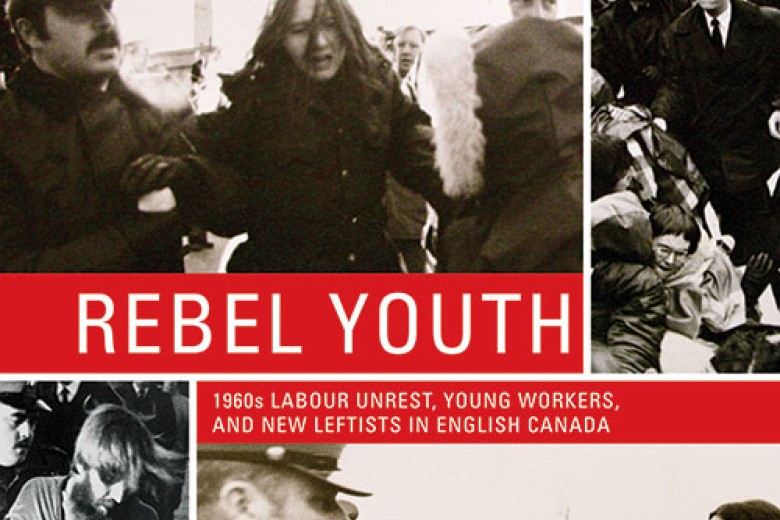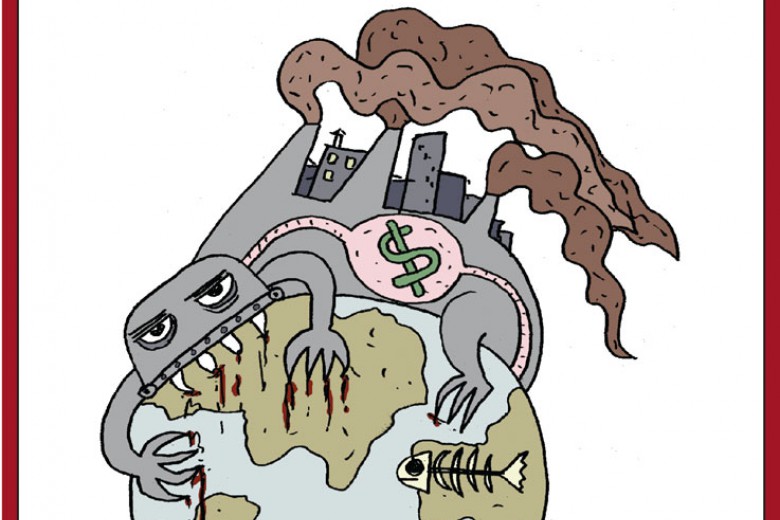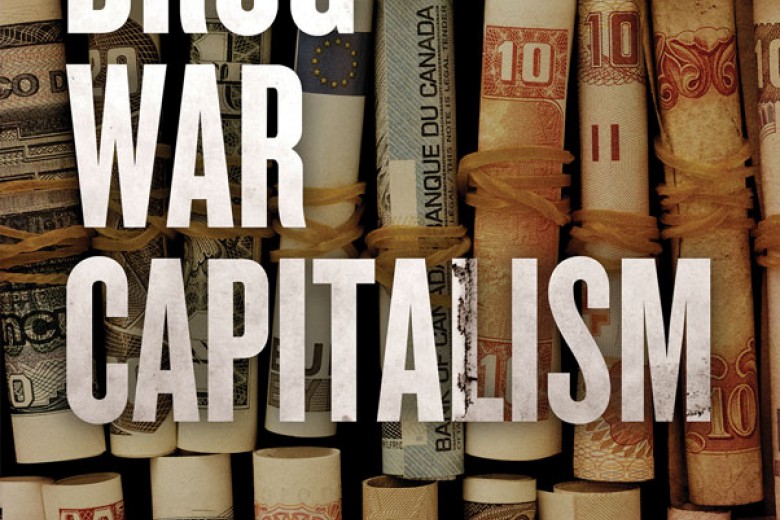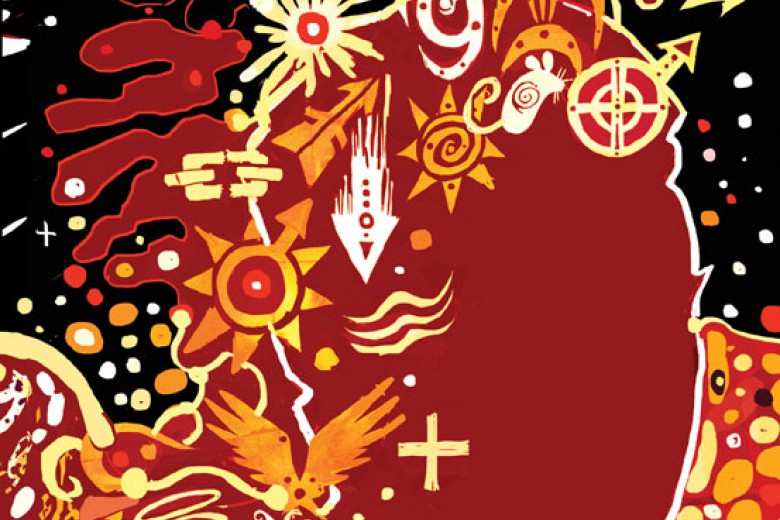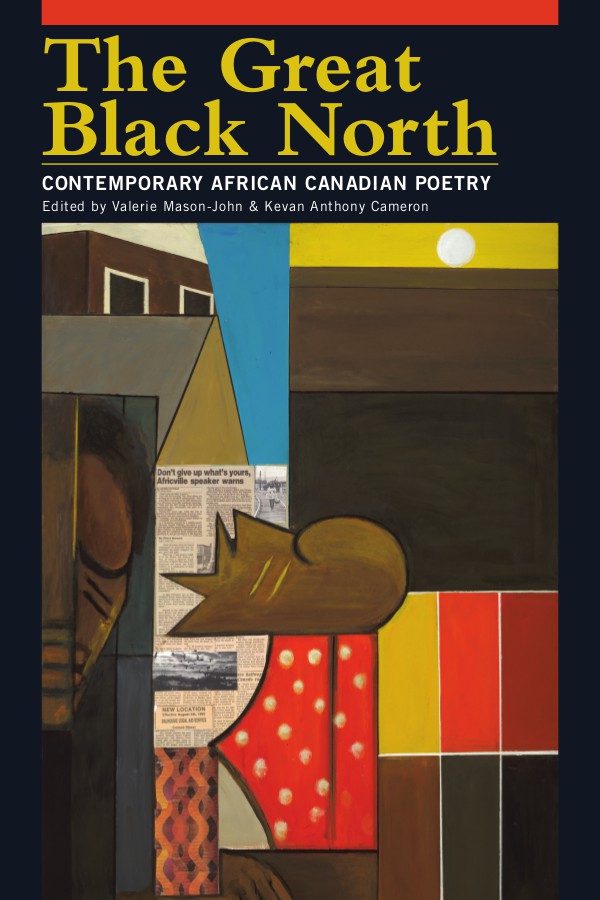
Edited by Valerie Mason-John and Kevan Anthony Cameron
Frontenac House, 2013
Without a meaningful preface, and sometimes even with that imperative framing, anthologies fail to capture what they set out to present. The Great Black North is the first comprehensive anthology of black Canadian poetry since Harold Head’s Canada in Us Now was published in 1976, and the editors have a simple argument: performance poetry is poetry. Edited by performance poets Valerie Mason-John and Kevan Anthony Cameron, the book both sets a stage and is an attempt at staging history, archive, tradition, and the perhaps baffling idea of Canadian blackness.
In this staging, the literal stage of performance spaces is privileged. The collection, featuring poetry from more than 90 poets, divides the poems into “page” or “stage,” with the former devoted to the written poetry of writers like M. NourbeSe Philip and Olive Senior and the three-part stage section showcasing the performance genres of dub, spoken word, and slam. In this way, the anthology rejects the Eurocentric conception of literature that has tended to disregard oral traditions and the unwritten word – the sounds of black poetry.
Beyond the focus on performance, another recurring theme is drawn out in George Elliot Clarke’s introduction: weather. As a subversion of the expansive, snowy metonym of the Great White North, the Great Black North retains the former’s meteorological largesse. It evokes the North Star and freedom for slaves, but it also has a more sinister connotation: the “black” of Canada’s oil boom, a dystopia of tarsands and sludge. In an otherworldly testament to long winters titled “scenes from a winter home,” Adrian Worrell writes: “canadian ash / coats my words.”
It seems clichéd to talk about weather and Canada, but weather is a force that makes its claim on all people, even if it’s untrue that weather affects everyone the same way. Nevertheless, weather conjures shared feelings promoting an imagined community. Talking about weather allows us to talk about feelings, sensations, and vulgar drips of a nose. We can talk about the kinds of bodily feelings invoked by Wayde Compton’s whirling “Loxodromic,” a poem best read out loud without swallowing.
As a work relying on nationalism, obvious themes emerge in this collection, including family, racism, environment, education, violence, capitalism, and gender, but there are also more subtle themes, as present in John Andrew Omowale Akpata’s “vibrato [that] can be felt across the street.” Freedom, meanwhile, is less a theme and more a refrain. We hear it and we hear it, but we don’t necessarily understand its meaning.
The collection labours toward a recuperation of history in the spirit of spoken word artist Komi Olafimihan’s wish: “If I could / I would write you back to life.” Capital-H history buries events easily forgotten by the national imagination: the destruction of Africville, N.S., or the life of Marie-Joseph Angélique, a black slave hanged in Montreal in 1734. Multicultural Canada’s prided themes – such as the Underground Railroad – are not rooted in salvation here. No, they take shape in Michael Fraser’s poem as “a Halloween of lies.”
The collection positions black Canadians as part of the polity, as poetic subjects deserving of critical praise, as historical. Yet many poets spend so much time wanting to be included in Canada’s multicultural plan they fail to present the stakes of inclusion. That is, they fail to offer critiques of the state itself. Canada’s diversity myth is taken for granted as a natural medley of people, a state of being, or an ambition, rather than, say, as Abebe DeRango-Adem’s “chaos of forms.”
In an attempt to bring clarity and rigour, the editors honour categories – print, dub, spoken word, slam – while at the same time failing to fully display the interconnectedness of printed poetry and performance. Because the majority of these poems were written to be heard, not read, we lose something on the page – uncontrollable shivers – and maybe we’d be better off going to YouTube. “NeoCanadian Version” by dub poet Klyde Broox, whose live performances convey nuance, reads as patriotism in earnest. For slam poetry, the audience is as important as the poet, but a book leaves you alone to mimic the snaps, the oohs and aahs. I missed the rasp and silent urgency in a voice like Ian Kamau’s.
Much like the editors describe dub poetry as the rearrangement of ideas, the collection itself attempts to do the work of creating new meanings. Still, we could use more framing, groping, reaching, risk, and, essentially, more attention to the preface. As much as The Great Black North is a celebratory reminder that black Canadian poetry exists, and has long existed, this anthology also serves to bring a black poetic tradition into being and, ultimately, helps create a black Canadian poetry in the process.


